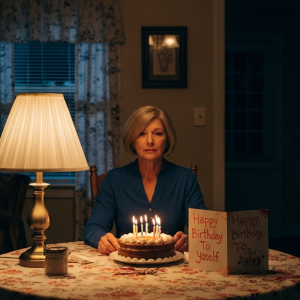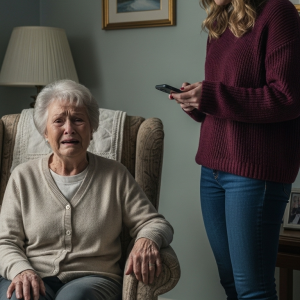“Now that Daddy’s dead, pack your things and find yourself a new home. This house was never really yours anyway.”
The words, delivered by my stepdaughter Sarah with a smirk that curdled my stomach, hit me like a physical blow. Twenty-five years of marriage, of raising her and her brother as my own, and they couldn’t even wait twenty-four hours after the funeral to show their true colors. I walked out of the house that had been my home, carrying a single small suitcase, while Sarah watched from the window, probably laughing.
It had started during the service. I saw Sarah whisper to her husband, Mark, pointing at me and mouthing the words, “gold digger.” The sheer audacity of it, after I had quietly paid her sons’ private school tuition from my own account for three years, was breathtaking.
After the funeral, back at the house, the pretense shattered completely. “You heard what my wife said,” Mark grunted, puffing out his chest. “Time for you to go back to whatever trailer park you crawled out of.”
“I’ll give you thirty minutes to pack,” Sarah announced, checking her phone as if I were a minor inconvenience in her busy schedule. “Then Mark’s calling the police.”
The neighbors were certainly getting a show. Mrs. Patterson from next door was peeking through her curtains, her face a mixture of shock and morbid curiosity. I gave her a small, defiant wave.
“This is my father’s house,” Sarah’s voice rose, laced with a venom I hadn’t heard since she was a teenager. “You were just the hired help who got lucky.”
Hired help. Twenty-five years of love and devotion, reduced to a transaction. I bit my tongue so hard I tasted blood, but I managed a serene smile. If only she knew what her father, Robert, and I had planned. If only she knew what I already knew.
I packed in silence, their eyes following me like vultures. Sarah trailed me from room to room, a self-appointed guard making sure I didn’t steal any of what she considered her birthright. “Don’t even think about taking any of Mom’s jewelry,” she snapped as I passed her mother’s old jewelry box.
I paused, turning to her with the sweetest smile I could muster. “Wouldn’t dream of it, dear.” The irony was delicious. The real jewels Robert had left me weren’t locked in that dusty box.
As I walked out the front door, Mark called after me, “Don’t bother coming back! We’re changing the locks tonight!” I turned for one last look and saw Sarah in the doorway, arms crossed, a triumphant smile on her face. She actually waved.
That night, I cried myself to sleep in a cheap motel room that smelled of stale cigarettes and regret. But by morning, the grief had hardened into resolve. I had a plan. And unlike Sarah’s, mine was built on truth, not greed.
The bank opened at nine sharp. I was the first customer, armed with my marriage certificate, my identification, and twenty-five years of quiet dignity. The manager, Mr. Davidson, had handled our family’s accounts for over a decade. His professional demeanor shifted to one of grave concern as he accessed the estate records.
“Mrs. Peterson,” he said carefully, “Your husband’s attorney contacted us yesterday. The formal will reading is next week, but I can share some preliminary information about accounts where you are listed as a primary beneficiary.”
My heart hammered against my ribs. It was time to see just how wrong Sarah had been about everything. Mr. Davidson turned the monitor toward me. The numbers on the screen were staggering.
“You are the primary beneficiary on several major investment accounts,” he explained. “And there is a private portfolio in your name that your husband funded, quite substantially, over the years.” Robert had been quietly building a fortress for me, a financial sanctuary that Sarah and her greed knew nothing about.
“There’s something else,” Mr. Davidson continued, his voice dropping. “Your husband added you as a signatory on the children’s trust accounts last year. The records show some… highly unusual activity.”
He spread the transaction records across his desk. The accounts, meant for Robert’s grandchildren, were supposed to be untouched until they turned twenty-five. But for the past eighteen months, there had been a steady bleed. Hundreds of thousands of dollars, systematically siphoned out.
“Who authorized these withdrawals?” I asked, though I already knew the answer.
“Your stepdaughter, as the appointed trustee. The memo lines indicate ‘educational expenses’ and ’emergency medical costs’.” He paused, choosing his words diplomatically. “But the amounts far exceed any reasonable expenses for children that age.”
Sarah. The woman who had called me a gold digger had been robbing her own children. The hypocrisy was so profound it was almost comical.
“I need you to freeze these accounts immediately,” I said, my voice cold and clear. “And prepare all documentation for the will reading. I also want a formal audit.”
From the bank, I drove straight to Patricia Walsh’s office. As Robert’s attorney for thirty years, she was a bastion of integrity and sharp legal intellect. Her reaction to the trust fund embezzlement was exactly what I expected.
“This is criminal, Margaret,” she said, her eyes flashing with anger. “Robert was so worried about Sarah’s behavior. He came to see me six months before he passed. He wanted to ensure you would be protected.”
She handed me a sealed envelope. “He asked me to give you this after the will reading, but given this discovery, I think you need to read it now.”
Robert’s handwriting was shakier than I remembered, but his words were a balm to my wounded heart.
My dearest Margaret,
If you are reading this, it means my fears about Sarah were justified. I love her, but I am not blind to her sense of entitlement or the cruelty she has shown you. The woman I married deserves better. Everything I have built, I built with you in mind. Use it wisely, use it well, and do not let anyone make you feel guilty for accepting what you have earned through decades of unwavering love and loyalty.
Patricia and I sat in silence for a moment after I finished reading. “The will reading is Friday at 2:00 PM,” she said gently. “The entire family will be present.”
“Perfect,” I replied. “That gives me three days to prepare.”
That afternoon, I made a phone call to the headmaster of the private school where Sarah’s sons were enrolled. “I trust you’re well, despite your recent loss,” he greeted me warmly.
“Thank you, Mr. Thompson. I’m calling about the Mitchell children’s tuition.”
“Of course. We were sorry to hear about the missed payment last month.” A missed payment. How interesting.
“Actually,” I said sweetly, “I need to inform you that I will no longer be covering the supplemental costs. That will be Mrs. Mitchell’s responsibility going forward.”
By three o’clock, my phone was ringing. Sarah’s voice was tight with panic. “What did you do? The school just called!”
“I stopped paying for something that was never my responsibility,” I replied calmly. “You’ve been paying their tuition?” Her voice was a squeak of disbelief.
“The portion you couldn’t afford, yes. For three years.”
The silence on the other end of the line was beautiful. I could almost hear the gears in her head grinding as she tried to process this new reality. “Margaret, we need to talk.”
“Do we? Because yesterday, you seemed quite clear that I wasn’t family.”
“Please,” she begged. “Can we just talk?”
I let her sweat for a moment before agreeing to meet the next morning. It was time to let her spend a long, sleepless night wondering just how deep the hole she’d dug for herself truly was.
Sarah was already at the coffee shop when I arrived, looking like she hadn’t slept in a week. Guilt and panic were not a good look for her.
“Thank you for coming,” she mumbled, staring into a cold cup of coffee.
I sat down and waited. Silence can be a formidable weapon.
“I didn’t know you were helping with the payments,” she finally whispered. “I thought… I thought the trust fund was covering everything.”
“The trust fund money you’ve been illegally withdrawing?” I asked, my voice deceptively sweet. Her face went pale. “How did you know about that?”
“Your father made me a signatory on those accounts last year. I can see every transaction, Sarah. Turns out the ‘hired help’ has access to all sorts of interesting information.”
She started to cry then—desperate, frightened sobs. “It wasn’t supposed to go this far.”
“How far was it supposed to go? Mark’s business was failing. You were behind on the mortgage. So you decided to steal from your own children’s inheritance.”
“I was going to pay it back!” she insisted. “Once the main inheritance came through.”
I pulled out my phone and showed her the summary Mr. Davidson had prepared. “Sarah, you have taken nearly $300,000 from those accounts. Five thousand here for ‘educational expenses’ that went to your mortgage. Ten thousand there for a ‘medical emergency’ that funded your vacation to Hawaii.” Each example was a dagger.
She buried her face in her hands. “Oh God, what have I done?”
“You’ve committed a felony, Sarah. And you’ve destroyed your relationship with the one person who could have helped you.”
I leaned forward, my voice softening slightly. “Did you ever wonder why your father married me? He didn’t need a sugar baby. He needed someone who would love his children, who would put his family first. I chose not to have children of my own because you and David were my children.”
For the first time, a flicker of something other than self-interest crossed her face.
“The will reading is tomorrow,” I said, standing to leave. “After that, everyone will know.”
“Are you going to have me arrested?” she asked, her voice trembling.
“That depends on what you do in the next twenty-four hours.”
“What do you want from me?”
“I want you to be the daughter your father raised you to be. The woman he always believed you could become. Figure it out.”
As I walked away, she called after me, her voice broken. “Margaret… I’m sorry. About everything.”
For the first time, I saw the scared sixteen-year-old who had lost her mother and never learned how to let anyone else in. “I know you are,” I said. “Now prove it.”
The will reading was pure theater. Sarah sat between her brother and husband, looking like she was awaiting execution. The tension in Patricia Walsh’s conference room was palpable.
Patricia began by announcing the ongoing investigation into the trust accounts. Mark’s face turned a blotchy red. “That’s ridiculous! Sarah was the trustee!”
“Being a trustee doesn’t authorize personal use of funds,” Patricia replied coolly. Sarah had gone completely white.
The will itself was a masterpiece of Robert’s foresight. I inherited the house, the beach property, and a sixty percent controlling share in Peterson Construction. David received twenty percent of the business. Sarah received fifteen percent and her trust fund—or what was left of it.
Then, Patricia read the letter Robert had included. He praised my love and loyalty and admonished Sarah for her entitlement and her treatment of me. Sarah’s tears were flowing freely now.
Mark, however, was not finished. “This is insane!” he exploded after the reading. “She gets everything while the real children get scraps! She manipulated a sick old man!”
I’d had enough. “Mark,” I said, my voice cutting through his tirade. “Would you like to explain to everyone how your wife spent her children’s inheritance?”
The room went dead silent.
I pulled out the preliminary audit report. “Sarah has withdrawn nearly $300,000 from her children’s trust funds. The money that was supposed to fund their college education went to cover your mortgage, your credit card debt, and your personal expenses.”
The reaction was explosive. David stood so fast his chair crashed to the floor. “Sarah, tell me this isn’t true!” Sarah could only sob while Mark sputtered denials.
“There’s something else,” I added, enjoying the moment. “The business has been carrying significant debt, which Sarah, as financial manager, failed to disclose. It seems funds were transferred to personal accounts, and there were fake vendor payments.”
“You can’t prove any of this!” Mark bellowed, swaying slightly.
“Actually,” Patricia said, sliding a folder across the table, “we can. Embezzlement charges were filed with the district attorney this morning.”
Sarah let out a wail of despair. “Margaret, please! You said you’d give me 24 hours!”
“I gave you 24 hours to confess to your family and take responsibility,” I corrected her. “Instead, you let your husband attack me and you continued to lie.”
As the family filed out in stunned silence, Sarah caught my arm. “Please,” she whispered. “Isn’t there some way to fix this?”
I looked into her desperate eyes. “There might be,” I said quietly. “But it would require you to be completely honest. With everyone.”
Three weeks later, a changed Sarah appeared at my hotel room door. She brought coffee and a thick folder containing a full financial confession. Every withdrawal, every lie. She also brought documentation of Mark’s gambling debts, which, it turned out, was where most of the money had gone.
“The prosecutor wants to meet tomorrow,” she said, her voice hollow. “My attorney thinks if I cooperate, I might avoid prison. Also… Mark is no longer my problem. I filed for divorce yesterday.”
She had hit rock bottom, but in doing so, had found a sliver of solid ground. She explained how Mark’s gambling addiction had destroyed their finances and how she had enabled him, convincing herself she was protecting the family.
Then came the part I hadn’t expected. “I want to sign over full custody of the boys to you,” she said, tears streaming down her face. “I’m going to have a criminal record. They deserve better. You’ve been more of a grandmother to them than I’ve been a mother.”
I took her hand. “Sarah, what you’ve done is terrible, but giving up your children isn’t the answer. The answer is taking responsibility. Making restitution. And fighting every day to become the person your father believed you could be.”
She told me then about her last conversation with Robert. He had made her promise to take care of me, worried about how she would treat me after he was gone. “I looked my dying father in the eye and promised,” she sobbed. “And then I threw you out of your own house.”
I squeezed her hand. “Then let’s start keeping that promise now.”
The next morning, I sat with her as she laid out every detail of her crimes to the prosecutor. It was a brutal, unflinching confession. The plea agreement was harsh but fair: three years probation, complete restitution, and a thousand hours of community service. It was far better than the prison sentence she deserved. The hard work was just beginning.
The house sold quickly. With her credit destroyed and facing criminal charges, Sarah had to find an affordable apartment for herself and the boys. It was a small, two-bedroom unit with thin walls and outdated appliances—a stark comedown from the McMansion they couldn’t afford.
“It’s perfect,” her son Tyler announced. “Way better than listening to Dad yell about money all the time.”
She needed a co-signer for the lease. I expected it, and I had my conditions. “If I co-sign this lease,” I told her over coffee, “what happens if you relapse into old behaviors?”
She met my gaze directly. “Then you kick me out and take custody of the boys. If I screw this up, they deserve stability more than they deserve my pride.” The Sarah who had thrown me out six months ago would never have said those words. I agreed to co-sign.
Life became a series of small, difficult steps forward. Sarah worked two jobs—bookkeeping by day, tutoring by night. The boys got part-time jobs. They lived on a strict budget. I taught Sarah how to cook simple meals, how to manage a household without luxury. Moving day was a family affair, with David and his family helping. It was the first time in years we felt like a real family, albeit one forged in the fires of criminal charges and divorce.
“I keep waiting for the other shoe to drop,” she admitted one evening, sitting on her secondhand couch. “For you to decide I don’t deserve this help.”
“Sarah,” I said, “do you know why your father fell in love with me? Because I saw potential in people, even when they couldn’t see it in themselves. I see a woman who made terrible mistakes but is willing to do the hard work of changing. That’s more than most people ever manage.”
Just as a fragile peace began to settle, Mark reappeared. He showed up at the apartment drunk, violating the restraining order Sarah had been forced to get. I moved Sarah and the boys into my new townhouse immediately.
“This is all your fault!” he screamed at me over the phone after his second arrest. “You destroyed my family!”
“Your gambling addiction destroyed your family, Mark,” I replied coolly. “Sarah and the boys are safe, and they are going to stay that way.”
Watching Sarah handle the situation showed how much she had grown. She calmly worked with her attorney, filed for an emergency custody order, and set firm boundaries. She protected her children with a strength she’d never had before. The boys, now old enough to understand, were relieved. “We’re glad you divorced him, Mom,” Tyler told her. “He was making everyone miserable.”
Four months later, Sarah’s hard work paid off. She was offered a full-time position with benefits at the accounting firm where she worked. She had disclosed her criminal record during the interview, and they had hired her anyway. Jake was accepted to State University with a partial scholarship.
To restore the boys’ trust funds completely, Sarah made a difficult decision: she sold her late mother’s treasured jewelry collection, keeping only the wedding ring. “Mom would want her grandsons to have every opportunity,” she said, her voice firm. “Their education matters more than ‘stuff’.”
Five years after Robert’s death, I stood in the backyard of Sarah’s new house, a modest three-bedroom she’d purchased after a promotion. We were hosting the annual Robert Peterson Memorial Scholarship Barbecue, an event that had become a community celebration. The scholarship, which I established, was for students who had overcome significant family challenges.
Sarah, now on the selection committee, introduced me to the first graduate, a young woman named Jessica. Her story was heartbreakingly similar to what my grandsons had endured. “Sarah found me crying in the guidance counselor’s office,” Jessica explained. “She told me about the scholarship, but she also told me her own story. She gave me hope.”
Later, as the guests left, Sarah and I sat on her back porch. “Do you ever think about what would have happened if I hadn’t changed?” she asked quietly.
“I would have followed through on the charges,” I said honestly. “You would have gone to prison. Sometimes love means letting people face the full consequences of their choices.”
“I’m glad I chose differently,” she said.
“Me too, kiddo,” I replied. “Me too.”
She was quiet for a moment. “Do you think Dad set this all up? Like he knew what would happen when he changed his will?”
I smiled, thinking of my brilliant, chess-playing husband. “I think your father knew his family. He planned for consequences to have meaning. Whether you learned from them or not was up to you.”
“I’m glad he did,” she said. “Because now I know who I really am when everything is stripped away. And I like that person.”
She leaned over and hugged me. “Thank you for not giving up on me.”
“I love you, kiddo.”
“I love you too, Mom.”
After twenty-seven years, she finally called me Mom. Robert’s plan, in all its painful, complicated glory, had worked. He had gotten exactly what he wanted: a family that understood that character matters more than entitlement, and a wife who was finally, unequivocally, home.




